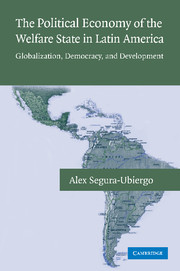 The Political Economy of the Welfare State in Latin America
The Political Economy of the Welfare State in Latin America Book contents
- Frontmatter
- Contents
- Tables and Figures
- Acknowledgments
- 1 Introduction
- 2 The Historical Evolution of Welfare Systems in Latin America: Qualitative Comparative Analysis
- 3 Theoretical Framework and Main Hypotheses
- 4 Determinants of Social Spending in Latin America: A Time-Series Cross-Section Analysis, 1973–2003
- 5 Chile: A Classic Latin American Welfare State under Authoritarian Stress (1973–1989) and Democratic Reinvention (1990–2000)
- 6 Costa Rica: Globalization, Gradual Reform, and the Politics of Compensation, 1973–2002
- 7 Peru: Political Instability, Regime Change, and Late Economic Reform in a Non-Welfare State, 1973–2000
- 8 Conclusion: Summary and Final Reflections on the Sustainability and Effectiveness of Latin American Welfare Systems
- Bibliography
- Index
8 - Conclusion: Summary and Final Reflections on the Sustainability and Effectiveness of Latin American Welfare Systems
Published online by Cambridge University Press: 10 July 2009
- Frontmatter
- Contents
- Tables and Figures
- Acknowledgments
- 1 Introduction
- 2 The Historical Evolution of Welfare Systems in Latin America: Qualitative Comparative Analysis
- 3 Theoretical Framework and Main Hypotheses
- 4 Determinants of Social Spending in Latin America: A Time-Series Cross-Section Analysis, 1973–2003
- 5 Chile: A Classic Latin American Welfare State under Authoritarian Stress (1973–1989) and Democratic Reinvention (1990–2000)
- 6 Costa Rica: Globalization, Gradual Reform, and the Politics of Compensation, 1973–2002
- 7 Peru: Political Instability, Regime Change, and Late Economic Reform in a Non-Welfare State, 1973–2000
- 8 Conclusion: Summary and Final Reflections on the Sustainability and Effectiveness of Latin American Welfare Systems
- Bibliography
- Index
Summary
This book has studied the reasons why some Latin American countries have historically constructed more developed welfare systems than others during the preglobalization period (i.e., 1920s –1970s) and how these welfare systems have been transformed by the more recent processes of globalization and democratization that have swept Latin America during the last three decades. This concluding chapter recapitulates the main findings, highlights some limitations of the study, and suggests a number of areas for future research. The chapter is divided in two sections. The first section provides an overview of the main findings regarding (1) the historical development of welfare systems in Latin America, (2) the determinants of changes in social spending in the 1973–2003 period, and (3) the in-depth case studies of Chile, Costa Rica, and Peru.
The second section briefly analyzes two of the most important challenges facing Latin American welfare systems in the future and suggests a number of issues for future research. The first challenge is how to reconcile current levels of welfare effort, or even expand them, within existing macroeconomic (especially fiscal) constraints. As the cases of Chile under Allende (1970–1973) and Peru under García (1980–1985) demonstrated, to expand social welfare without paying attention to basic macroeconomic fundamentals has devastating consequences for the economy at large and the welfare state in particular. The second challenge is how to increase the effectiveness of Latin American welfare systems.
- Type
- Chapter
- Information
- The Political Economy of the Welfare State in Latin AmericaGlobalization, Democracy, and Development, pp. 259 - 280Publisher: Cambridge University PressPrint publication year: 2007


